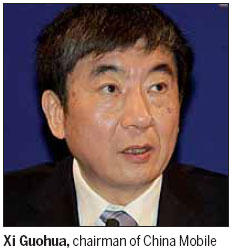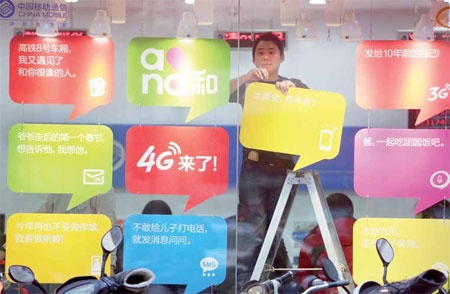China Mobile moves into next generation of communications
Updated: 2014-01-03 10:00
By Shen Jingting (China Daily Europe)
|
|||||||||||
Nation's biggest telecom operator to roll out its 4G service in 340 cities this year
China Mobile Communications Corp, the parent company of China's biggest telecom carrier, China Mobile Ltd, announced it will offer commercial fourth-generation telecom services in 340 Chinese cities this year.
Xi Guohua, chairman of China Mobile Ltd, said on Dec 18 that the company will build 500,000 4G base stations across China in 2014, constituting the world's largest 4G network. The company currently has about 200,000 4G base stations.
Xi spoke during the China Mobile Global Partner Conference in Guangzhou.
China Mobile will offer 4G services in 16 cities, including Beijing and Shanghai, by the end of 2013, Xi said. In Beijing, the company's 4G network already covers the area inside the Third Ring Road.
Customers don't need to change their phone numbers, but just get a new SIM card for their 4G handsets. The new mobile network achieves data download speeds of up to 80 megabits per second, four times faster than 3G networks.
"China Mobile's marketing focus next year (2014) will be in terminal sales, since mobile terminals support the development of mobile Internet," Xi pointed out.
He predicted that the total number of TD-LTE mobile phone models will exceed 200 and entry-level 4G smartphones will hit the market in 2014.
China Mobile is targeting sales of 190 million to 220 million mobile terminals running on its wireless networks by 2014, Xi said. Of those, about 100 million handsets should be 4G smartphones, Xi added.
On Dec 23, Apple and China Mobile officially announced a multiyear agreement to bring iPhone smartphones to the mainland market. China Mobile is the last Chinese telecom operator to introduce iPhone handsets on contract in China.
Chinese buyers can purchase iPhone 5s and iPhone 5cs through China Mobile's more than 65,000 points of sale, as well as Apple retail stores across the country, beginning on Jan 17.
Analysts say China Mobile's move is decisive and ambitious, and shows a strong desire to win back customers that it lost in the 3G market competition.
Because China Unicom and China Telecom did not have enough incentives to widely launch TD-LTE 4G networks, and the Chinese government has yet to hand out the FDD-LTE licenses that the two carriers prefer, China Mobile "might be the only 4G operator in China at least in the next six months", says Bryan Wang, principal analyst with Forrester Market Advisory (Beijing) Co Ltd.
China Mobile's target of 100 million 4G smartphone sales in 2014 is "somewhat surprising", since the carrier's total user base was about 760 million in October, he says.
China United Netcom Ltd and China Telecom Corp Ltd managed to increase their 3G user base to 100 million each over three years, "but China Mobile wants to achieve a similar goal in one year", Wang says.
The bold target, in terms of both network deployment and smartphone sales, will inevitably impose a heavy burden on China Mobile's budget, Wang says.
"China Mobile is very likely to make record high capital expenditures in 2014, even though the company already invested huge sums in 4G projects this year (2013)," he adds.
The introduction of Apple Inc's iPhone handsets could be even more costly. Since China Mobile will offer generous incentives for high-end 4G flagship smartphones such as the iPhone 5S, the company may spend tens of billions of yuan in device subsidies in 2014, Wang says.
According to China Mobile's financial statements, its capital spending in 2013 will be up 49 percent to 190.2 billion yuan ($30.5 billion). More than half of the company's network expenditure, 42 billion yuan, is flowing into the 4G sector.
Zeng Jianqiu, a professor at the Beijing University of Posts & Telecommunications, says China Mobile's 4G strategy dovetails with China's broadband target. The country intends to be fully connected to the Internet by 2015.
In addition, the Chinese government aims to boost public sector and household spending on the information technology industry by more than 20 percent annually through 2015.
"The major challenge for China Mobile is how to involve more customers in using the 4G network," says Zeng. On the one hand, the prices for 4G smartphones need to be low enough to attract the masses; on the other hand, the cost of 4G telecom service contracts must be broadly acceptable to people," Zeng says.
Ready for launch
Everything is almost ready for the launch of 4G services in China, says James Yan, an analyst with IDC China. "The timing is ripe and the industry environment could not be better. Customers favor smartphones, carriers have the motivation to offer 4G services and distributors know how to sell 4G products to people," Yan says.

The launch of 4G services in China will definitely be a new driver for the growth of the nation's smartphone market, he says, because people have new incentives to purchase mobile phones.
"Compared with people in developed North American and European countries, we found that Chinese people are the most interested in enjoying mobile video content," Wang says. "Mobile video is the leading feature of the 4G era. It perhaps indicates that Chinese people are more ready to embrace 4G services.
"The planned 4G commercial rollout is very good news for China Mobile, as well as for smartphone companies and mobile Internet companies," says Wang Jun, an analyst with Beijing-based research firm Analysys International. "The 4G business can help the carrier to attract more high-end users from rivals," Wang says.
But China Unicom and China Telecom are also stepping up the pace of investment in 4G projects.
Wang Xiaochu, chairman of China Telecom, said the company invested 10 billion yuan in 4G trial network construction in 2013. The figure will climb to 45.7 billion yuan in 2014.
China Telecom released its 4G brand on Dec 10. It will reportedly commence 4G services in China in the first quarter of 2014.
China Unicom said its 4G network will largely rely on FDD-LTE technology, the other mainstream 4G telecommunication standard that is widely adopted globally. Lu Yimin, general manger of China Unicom, said the company plans to launch 150 models of 4G smartphones in 2014.
"China Unicom's 4G network is going to be a 4G mobile network with the best coverage and user experience in the country. It will have a download speed of up to 150 Mbps," Lu said at a forum.
China Mobile also revealed its new brand called He (which translates as "and") on Dec 18, mainly targeting the upcoming 4G mobile business.
The logo for the new brand features green and peach colors. It combines the English word "and" with the Chinese character for he (), along with a rosy exclamation mark.
Li Yue, chief executive officer of China Mobile, says the logo signifies connection and communication. In addition, "and" is the acronym for "a new dream", which signifies China Mobile's intention to provide Chinese customers with the most advanced technology in the 4G era.
shenjingting@chinadaily.com.cn
|
A staff member checks China Mobile's 4G services advertisements at a business office in Shanghai in December. Provided to China Daily |
( China Daily European Weekly 01/03/2014 page22)
Today's Top News
Merkel fractures pelvis skiing, cancels visits
Portugal declares three-day mourning for Eusebio
Forbidden City to be closed every Monday
Icebreaker prepares for breakout
Beijing rejects Abe's call
Illegal ivory stash destroyed
Israeli ex-PM Sharon's condition in steady decline
Yahoo says ads in Europe spread malware
Hot Topics
Lunar probe , China growth forecasts, Emission rules get tougher, China seen through 'colored lens', International board,
Editor's Picks

|

|

|

|

|

|






